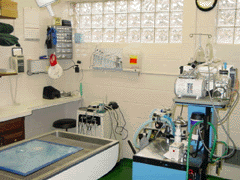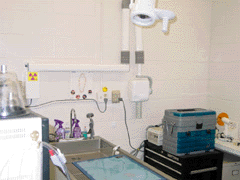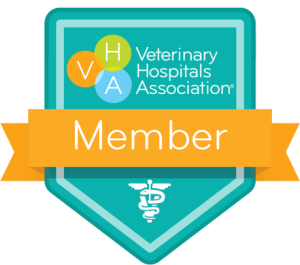Please allow me to introduce myself. My name is Dr. Ryan Speltz. I am a 1999 Graduate of the University of Minnesota’s Veterinary School. While gaining experience in general veterinary practice following graduation, I discovered my passion for enhanced and routine dental procedures. I enrolled in and completed the dental training series offered by the American Veterinary Dental Forum (AVDF) and have been a member of the American Veterinary Dental Society (AVDS) since 2001. I have devoted myself to fine-tuning my skills in advanced dental procedures at several Twin Cities clinics prior to joining the Skyline staff in the summer of 2003.
Root canals, dental radiographs, orthodontics, crowns, caps, implants and periodontal surgery for a pet??? You must be kidding! Not at all. Dental procedures are routinely performed in veterinary practices daily.


This state-of-the-art suite affords me the capability of performing human quality dental procedures on your pets.
Examination is the key to diagnostics and determination of the type of treatment needed. You can help by examining your pet’s teeth monthly. First smell the breath. If you note a disagreeable odor, gum disease may be present. Periodontal disease is the most common type of gum disease in small animals. Gum problems begin when bacteria accumulate at the gums at the base of the teeth. Unless brushed away daily, bacteria will destroy tooth-supporting bone, cause bleeding and lead to tooth loss if left untreated.
Next, examine your pet’s mouth for chips or fractures on the surface of the teeth. Contrary to popular belief, cow hooves, bones or other hard materials chewed by pets may break teeth.
Deep chips into dentin layers of the tooth may cause sensitivity. Fractures into pulp or dark areas deep into the tooth open up the tooth to oral bacteria and abscesses.
When your exam reveals dental problems, a visit to a veterinarian is in order. I can perform a detailed dental exam to help determine the proper treatment plan, other necessary tests, and/or anesthesia essential to adequately treat or control the problem.
Your dogs and cats do not have to suffer the pain and discomfort of untreated broken, loose teeth and infected gums. With your help, your pet can keep his or her teeth and enjoy good oral health!


